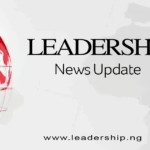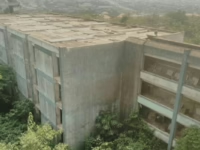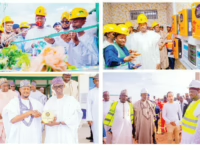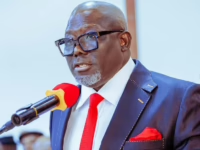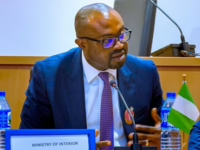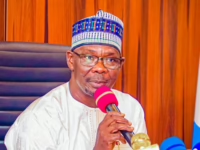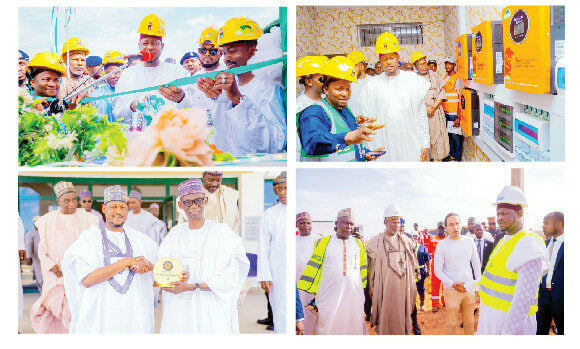The 38th anniversary of Katsina State’s establishment was anticipated as a moment of celebration, yet few expected the profound transformation it would reveal. Rather than a simple commemoration, the occasion evolved into a powerful statement of vision, as Governor Dikko Umaru Radda showcased what he terms “a meticulously crafted transformation that centers on dependable, sustainable, and affordable energy as the cornerstone of our economic advancement.”
From dawn, the atmosphere buzzed with excitement. Citizens, government officials, investors, and community advocates gathered beneath the radiant northern sun, their enthusiasm mirrored by the gentle hum of newly installed solar arrays and the subtle rotation of hybrid wind turbines on the horizon.
This event transcended a mere ceremony; it was a tangible exhibition of progress already in motion.
A Visionary Leader at the Helm
When Governor Radda addressed the audience, his speech resonated with the weight of achievement rather than empty promises.
“As we mark the 38th year since the founding of our cherished state, we do so not just to acknowledge the passage of time but to inaugurate a fresh chapter in our journey,” he declared.
“The initiatives we unveil today represent more than infrastructure; they are the embodiment of a deliberate and strategic transformation,” he emphasized.
He reminded attendees that from the outset of his tenure, his administration has operated under a “clear and disciplined development framework grounded in prudence and transparency.” This strategy, formulated less than three years ago, has already revolutionized the state’s energy sector.
In a region historically hampered by erratic power supply, he highlighted hospitals no longer vulnerable to outages, classrooms illuminated well into the night, and communities benefiting from uninterrupted clean water due to reliable pump operation.
“This is about more than just electricity,” he reflected thoughtfully. “It’s about protecting healthcare delivery, maintaining conducive learning environments, and ensuring the continuous flow of clean water in our neighborhoods.”
Quantifying the Ambition
Governor Radda’s composed assurance is backed by impressive statistics. In just over two years, his government has installed more than 1,020 megawatts of solar capacity, complemented by 10 megawatt-hours of battery storage to maintain power stability after sunset.
Previously neglected renewable assets, such as the 10-megawatt Lumberimi Wind Farm, have been revitalized and integrated with an additional 10 megawatts of solar power, forming what the governor proudly describes as “an innovative, locally driven model of clean energy generation in Nigeria.”
He also mentioned a 1-megawatt mini-hydropower facility at Danja Dam, developed through collaboration with French and Ocean Energy investors, alongside the state’s inaugural compressed and liquefied natural gas (CNG) station, nearing 90% completion and poised to offer cleaner, more affordable fuel for transportation and industry.
These projects are interconnected components of a comprehensive energy strategy designed to secure Katsina’s long-term prosperity.
Turning Plans into Reality
Governor Radda’s confidence was reinforced by preceding speakers. Dr. Hafiz Ibrahim, Special Adviser on Power, expressed sincere appreciation while outlining the diligent efforts behind the scenes.
“Our mission has been straightforward: to convert visionary ideas into enduring solutions. Alongside the committed team in the Department of Power and Energy, my role has been to follow the path you charted-one marked by prudence, discipline, and genuine concern for every citizen’s welfare,” he stated.
Gesturing toward the newly inaugurated facilities, he added, “The solar plant we commission today, the hybridization and reactivation of the Lumberimi Wind Farm, the mini-hydro installation, and the nearly completed CNG station are all fruits of your foresight.”
Dr. Ibrahim portrayed a leader deeply engaged beyond mere approvals. “Your compassion for rural communities, your attentiveness to expert counsel, and your unwavering demand for accountability have motivated every partner and team member,” he affirmed.
He pledged that the Department of Power and Energy would persist in expanding renewable energy access, empowering small enterprises with standalone solar solutions, and fostering the green economic zone as a flagship of sustainable industrial development.
Concluding, he offered a heartfelt invocation: “May Almighty Allah continue to grant you wisdom, strength, and good health as you guide us toward a future of prosperity and clean energy for all.”
Championing Northern Progress
Abdul Aziz Kabir Abdulahi, Technical Adviser on Renewable Energy to the Governor, framed the initiative within a broader regional and national perspective.
“This occasion is more than a project launch; it exemplifies genuine leadership and a courageous stride toward consistent advancement. His Excellency has demonstrated unwavering dedication to enhancing lives, ensuring reliable electricity, and safeguarding the environment for generations to come,” Abdulahi remarked.
He expressed particular pride in the tangible benefits for everyday citizens: “These projects power our hospitals, illuminate our streets, and support our schools. This administration prioritizes its people with innovative, robust, and equitable solutions.”
Forging an Industrial Future
Governor Radda emphasized that the unveiled projects mark just the beginning. He outlined ambitious plans for a Green Economic Zone-an industrial district fully powered by renewable energy.
“This zone will host factories free from power interruptions, where clean energy reduces operational costs, positioning Nigeria as a preferred investment destination and elevating Katsina as a competitive hub for manufacturing and export,” he explained.
He also committed to a comprehensive program equipping small and medium-sized enterprises with independent solar systems, enabling artisans, traders, and workshop owners to operate continuously without the burden of expensive diesel or unreliable supply.
“This initiative will lower expenses, boost productivity, and provide thousands of entrepreneurs with the stability necessary to grow their businesses,” he added, linking clean energy directly to economic empowerment.
A National and Regional Benchmark
By the conclusion of the event, the message was clear: Katsina is no longer content to follow Nigeria’s energy trends but is emerging as a leader. Its vigorous adoption of renewable energy aligns with the country’s commitment to net-zero emissions by 2050, positioning the state as a pioneer among sub-national entities.
Dr. Ibrahim described Katsina as “a beacon of sustainable industrial growth,” while Abdulahi asserted that no other northern state has matched its accomplishments.
For investors seeking reliability, communities demanding consistent power, and a nation aspiring to practical energy transitions, Katsina now stands as a living example.
The Evening Illumination
As night descended on the capital, the newly installed solar lights in schools and clinics flickered to life. The soft whir of 500 electric tricycles began to fill the streets. Families walked home beneath bright lamps that, just a year prior, would have remained dark.
The anniversary festivities gradually gave way to a typical evening, yet the transformation was unmistakable. Katsina’s leadership had not merely pledged a future powered by clean energy-they had activated it.
Governor Radda encapsulated the moment, stating, “Let this day serve as proof of what can be accomplished when ambition is paired with discipline and when commitments are fulfilled through action.”
Similarly, Engr. Abubakar Matazu, General Manager of Rural Electrification, recently initiated the distribution and installation of solar devices, including organic fertilizer, across all 361 wards of the state.
He explained that these solar units are being installed in Sangaya schools, hospitals, and other key locations as directed by the governor, with representatives from each ward trained in installation and usage.
In a region long plagued by power shortages and untapped opportunities, Katsina now shines as a beacon of green progress-a new dawn illuminating northern Nigeria and charting a course others are sure to emulate.


